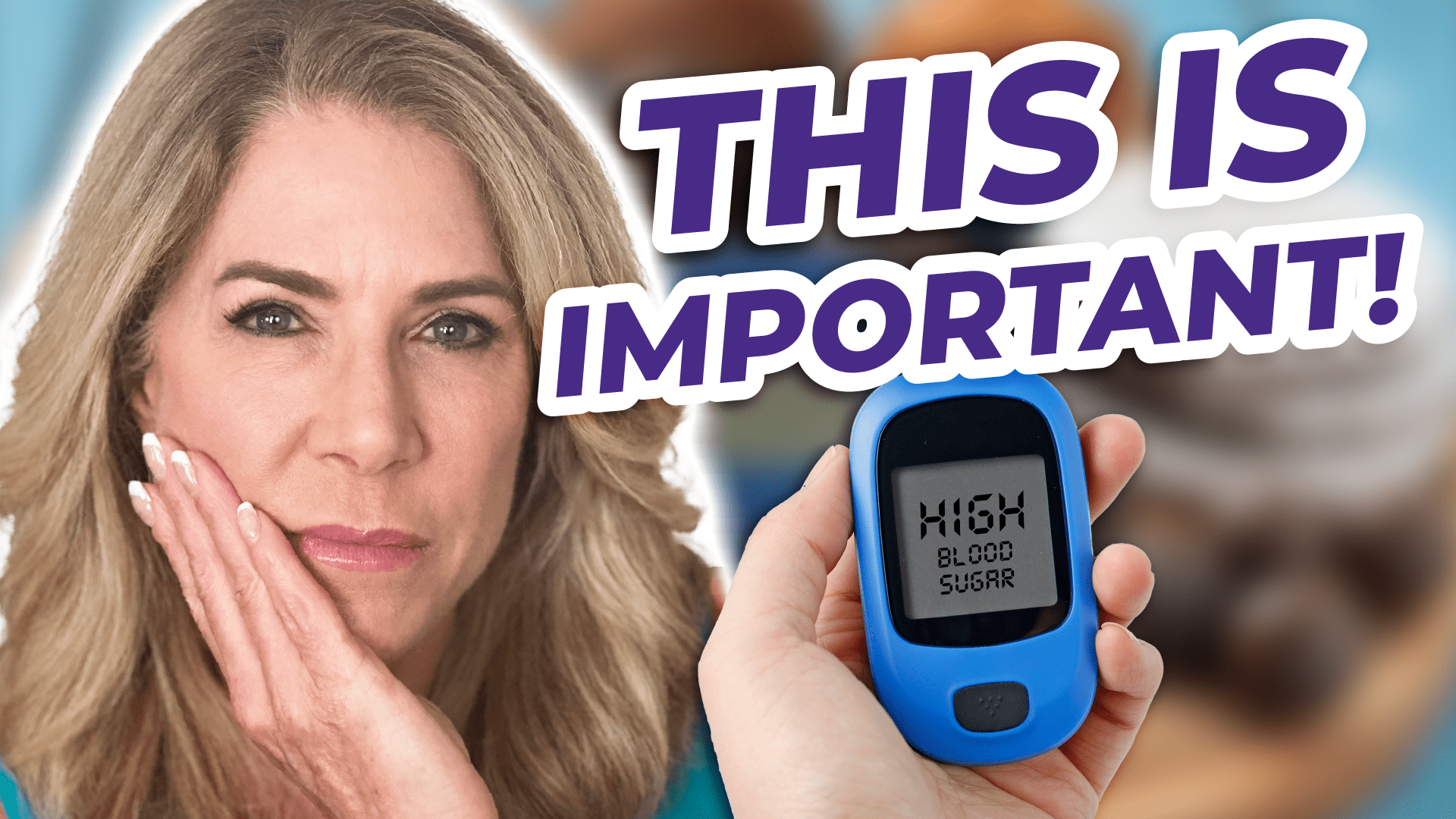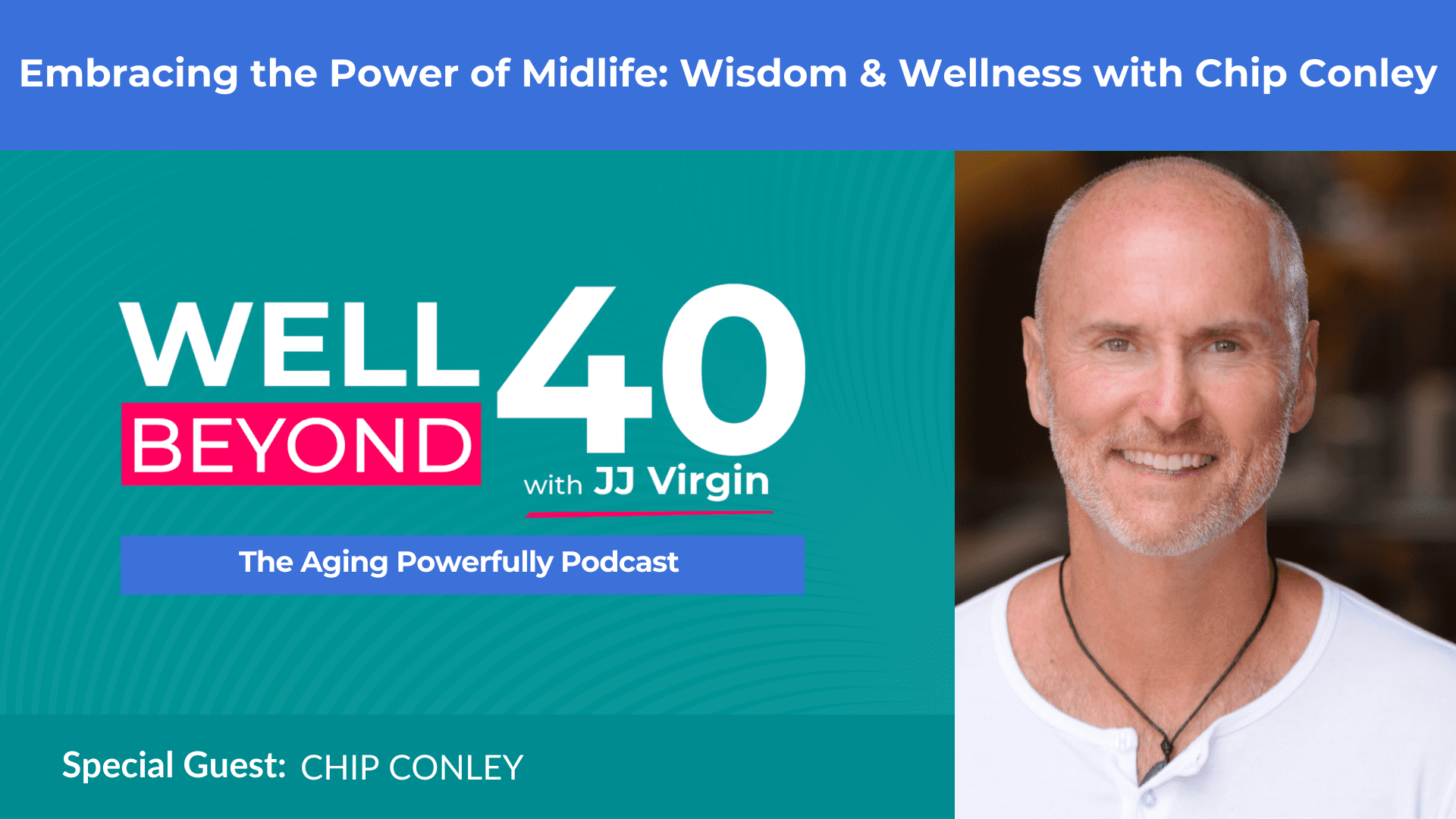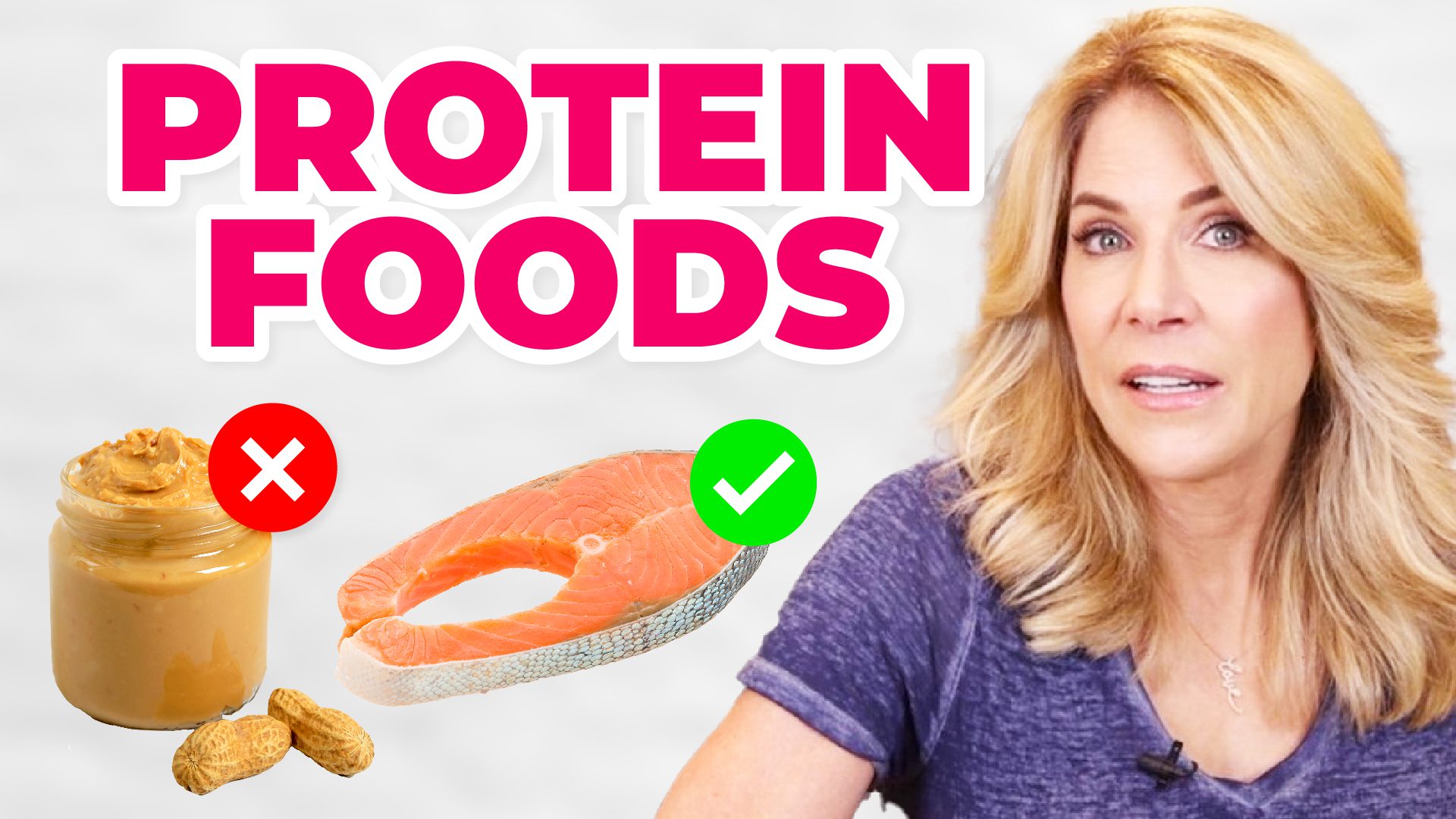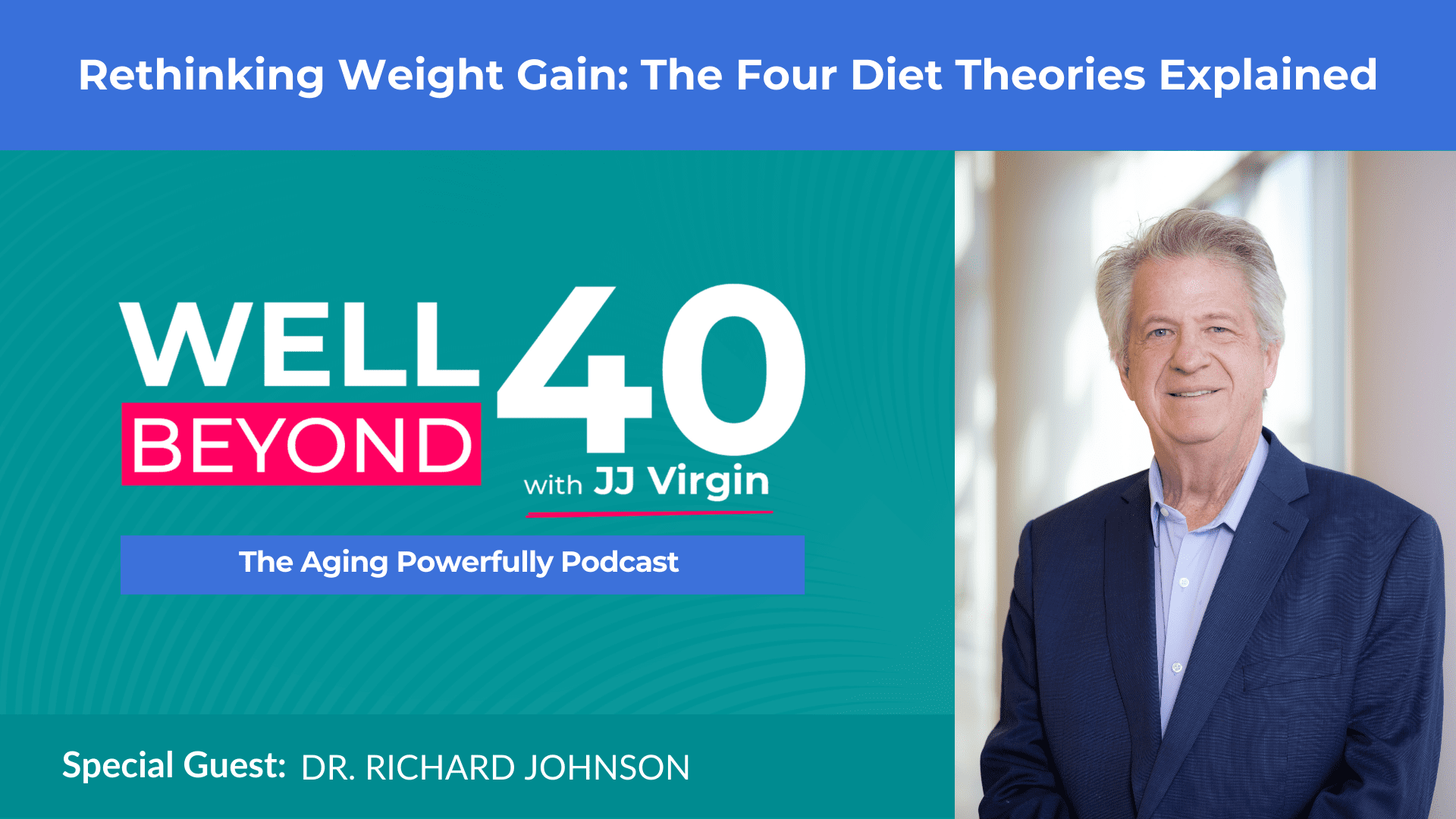7 Tips to Help Manage Insulin and Burn Fat All Day Long
What if I told you something as simple as your blood sugar could be the key to successful fat loss as you age? I want you to throw out everything you've learned about calorie counting, avoiding fat, and other outdated weight-loss advice. I'll walk you through how to eat your way to your ideal body composition.
Blood-sugar balance is important for fat loss because it helps the body burn fat more efficiently. When blood sugar isn't balanced, the body is more likely to store fat and become resistant to the effects of insulin, leaving you less able to access that stored fat for energy.
My #1 tool to help you stabilize blood sugar is always protein! In this episode, you’ll learn about the impact of protein on your fat-loss goals along with specific nutrients that can help manage your glucose response and keep your body in fat-burning mode throughout the day. I also share the foods to avoid that can sabotage your blood sugar.
But it’s not just what you eat…it’s also when you eat. And let’s not forget the importance of quality sleep and stress management. I’ll talk about all of this and give you some actionable tips and tricks to keep your blood sugar balanced and your weight down.
Timestamps:
00:01:01 – Why blood sugar balance is important for fat loss
00:02:12 – Tips for keeping blood sugar stable throughout the day
00:11:35 – Using a continuous glucose monitor to track blood sugar levels
Mentioned in this episode:
Watch the FULL VIDEO on JJ’s Youtube Channel
My All-In-One Shakes provide 30+ grams of protein to keep blood sugar stable
I drink Suja Lemon Love to lower blood sugar response before a meal
Take apple cider vinegar before a meal to lower blood sugar response
Designs for Health Berberine Synergy is great for blood sugar balance
Omega Plus can help balance blood sugar
Read The Sugar Impact Diet to learn how to tame your sweet tooth
Melatonin in the form of Sleep Candy before bed can increase insulin sensitivity
The Theia Health continuous glucose monitor is great for tracking blood sugar levels
ATHE_Transcript_Ep 540_Why Your Blood Sugar Is CRITICAL To Fat Loss Over 40
JJ Virgin: [00:00:00] Hey, this is JJ Virgin. Thanks so much for joining me. This is Ask the Health Expert. In each episode, I put the Power of Health in your hands and share ways to get healthy, lose weight, heal your gut detox, and lots more. So you can look and feel better fast if you'd rather watch the video. Hey, I did put on my makeup and do my hair, so check it out on my YouTube channel.
What if I told you that something as simple as your blood sugar levels could be the key to successful fat loss as you age. Well, it's true. So I want you to throw out everything you've learned about calorie counting, avoiding fat, and other outdated weight loss advice. I'm gonna walk you through how. Eat your way to your [00:01:00] ideal body composition.
So blood sugar balance is important for fat loss because it helps the body burn more fat more efficiently. When blood sugar isn't balanced, the body's more likely to store fat and become resistant to the effects of insulin. Then you're less able to access stored fat for energy and. Now when you eat sugary processed foods and snack all day long, you know what's happening.
You're keeping your blood sugar high and high blood sugar levels well then they trigger an insulin release, and then if insulin stays high, it basically locks the doors to your fat cells. Beyond that, high blood sugar levels can also lead to a damaging kind of inflammation. Chronic inflammation and chronic inflammation can also block fat loss plus high blood sugar.
glucose isn't getting into your cells. Your cells basically are resisting insulin, right? And glucose can't do what it needs to do. And this insulin resistance [00:02:00] eventually paves the way for type two diabetes, heart disease, and other bad things. So goal is we wanna keep blood sugar stable and insulin to come up and then to come back to.
And we do this first by eating by the plate. And you've heard me, if you've been listening to the videos, talk about eating by the plate. This is basically the trifecta of protein, healthy fats and fiber. So starts with protein first, and here's why I wanna make sure that you're getting at least 30 grams of protein at each of your three meals.
Protein, and especially when you eat it first, this is key critical. It's gonna help stabilize your blood sugar levels. Now, beyond that, protein is more thermic. It's more satiating. But what we're really looking at here is how to make sure that we're keeping your blood sugar levels stable. And we know that protein plus fiber slows down.
Stomach emptying, helps you feel fuller longer, and then that they both work together, [00:03:00] protein and fiber to keep your blood sugar level stable. They won't go up as high when you. . Right, and that's super important. Now, along with what you. , you're gonna wanna make sure you get a few specific nutrients that can help balance blood sugar.
Before we go into the supplement ones, here's some other things that you probably wouldn't go, that's not a nutrient, but I think of 'em like that. Remember, foods where we first get our nutrients, right? And one of the ones that you may not be thinking about is lemon juice. I drink something every day and I love to do this before lunch.
And it is called Suja Lemon Love. Shout out. And what it is is lemon juice, a little stevia and cayenne pepper, which of course helps boost your metabolism a little bit. But lemon juice has been shown to lower the blood sugar response to a meal. Similarly, vinegar does that too, so you can make a salad dressing with extra virgin olive oil, get those great polyphenols for your gut microbiome, and then add in some apple cider vinegar.
Vinegar can actually act like the diabetes drug, Metformin, to improve [00:04:00] insulin sensitivity. Like these are things we totally need to take advantage of. I also love to take some apple cider vinegar and put it into green tea. We know green tea can help with insulin sensitivity. I am obsessed with burberine.
Burberine is this botanical extract that influences multiple pathways in blood sugar metabolism and supports insulin sensitivity. So this is definitely one you wanna check out. And also Omega-3 S. Now I always talk about omega-3's. There's like, they do all these great things. One of the things, of course, is they help with lowering inflammation.
And as we know that inflammation can lead to insulin resistance and diabetes, but they can also help resensitize your insulin receptors. So they do multiple things. I'm gonna beat this horse dead. I've done it a bunch of times. We gotta talk about artificial sweeteners when we're talking about blood sugar.
So there was a study that looked at the impact of three popular artificial sweeteners saccharine, sucralose, aspartame. And they looked at [00:05:00] this on two different types of gut bacteria. And here is what is crazy. The equivalent of just two cans of diet soda could turn healthy gut bacteria into pathogenic or disease causing bacteria.
Okay? We also know that artificial sweeteners can lead to calorie dysregulation. What's that mean? You can't calibrate the degree of sweetness and the amount of calories you're eating. And you know what? That. Ya overeat. So bad news, no artificial sweeteners because they're bad news, but good news is there's plenty of great options out there.
Like if you're eating sweet, if you really like are dying for sweet, please read the Sugar Impact Diet and learn how to tame your sweet tooth. But if you want some sweet Stevia, monk fruit in my favorite. Allulose. Besides food, what else is there that's impacting blood sugar? Well, one of the big ones is meal timing because of course it's not just what you eat, right?
But it's also when you eat. And the first thing that I want you to look at is, is how [00:06:00] you space your meals. And when you eat your meals, here's how this all works. You're waking up in the morning, you want to eat two to three hours after waking, not right away. Cause you still gotta give your pancreas the time to go wake up.
Right? But get up in the morning. Meditate. If you're gonna do a fasted workout, now's the time, and then you'll eat two to three hours after waking up. Then I want you to. Every three to six hours, and this is important, no snacking. Every time you eat. Remember you're raising blood sugar. When you raise blood sugar, you gotta raise insulin to bring the blood sugar back down.
If you're eating every two hours, your body's never having a chance to, to get that insulin back down to fasting levels. That means that you're locking the doors to fat cells or eating every three to six hours. So let's say that you wake up 6:00 AM. You have breakfast at 9:00 AM and then you have lunch maybe around one now, the next thing you wanna make sure that you're doing is stop eating three to four hours before bed.
Three hours is the real cutoff. We wanna make sure that body can do what it needs to [00:07:00] do while it's sleeping. What I really want you to look at is eating within somewhere between, you know, I find for most of us, a nine to 10 hour window is great. Now, I mentioned sleep a little bit. There's a study that showed that a partial night's sleep deprivation just a little bit like, you know, you got five to six hours instead of your seven to nine hours can lead to insulin resistance.
You can be doing everything else, right, eating correctly, exercising, and you can get, have issues with insulin resistance because of poor sleep. One of the things that happens with insulin resistance, if your insulin's outta balance, it's gonna mess up your hunger regulating hormones like grehlin. And again, remember, your pancreas is snoozing, so insulin levels should be lowest at night because melatonin's up, insulin's down.
And here's what's also cool. One of the things you can do to help with this is take melatonin. So in my sleep candy I have melatonin. If we take melatonin before bed, it can actually help improve insulin sensitivity. It can help lower inflammation, [00:08:00] and it can help increase the hormones that help regulate blood sugar balance.
how cool is that? So what do we want? Seven to nine hours of quality sleep every single night. So if you are going, I still can't quite get that thing together. Check out some of my other videos on sleep and my blogs. I've done so much on this because it's so super duper important. And the other thing that's important, and boy did I learn this during the pandemic.
Is stress, cortisol, we've all heard about this. What your adrenal glands pump out. It's ideal, like short term, we gotta have this. It brings you, gets you, wakes you up every morning and it's gonna be something so your body can utilize glucose. It's important. We would die without it. , but we need to be able to have our body come up in the morning and then have a nice curve where it's coming down throughout the afternoon and low in the evening.
Where we get in trouble is when we have elevated cortisol when it shouldn't be, and what happens if we have elevated [00:09:00] cortisol Where it shouldn't be is your blood sugar will be higher than it should be. And when I look at at what we need to do to be healthy, it's of course sleeping well. It's of course eating well and supplementing it's.
and stress management. And stress management means find something that brings you bliss, whatever that thing could be for you. One thing that I hope brings you bliss is exercise, because just even a single exercise session can improve insulin sensitivity for at least 16 hours post-exercise, and that's for healthy people and type two diabetics.
And by the way, The most important thing of all to do is move. It's the most important. And so like don't get all bogged down in the best type of exercise. How long everything else? And then don't do anything, right? Most important of all, move more. And one of the things you can do as a hack is walk after you eat it lowers the blood sugar response to the meal.
But if I were going to look at the most important exercise we want you moving more, we want you walking as much as possible, park farther away. You know [00:10:00] that. And it's easy to do. Here's my. Get a big dog, but the next thing is build muscle. If you're over the age of 40 and you're not using it, you are losing it.
1% a year doesn't sound like much, but how much is that after 10 years? A lot more. And then at the age of 60, we start losing 2% a year. So we've got to be doing some exercise to help us build muscle is really where we are using sugar. It's, I call it the sugar sponge. During that workout, you know what you're using for.
Not fat. When you're doing heavy hard workouts, you're using sugar. You're using the sugar stored in your muscles, you're converting the fat and turning it into sugar to use it as muscle. So it is super duper critical to use. to do resistance training and build muscle mass. In fact, higher muscle mass relative to body size is associated with better insulin sensitivity and lower risk of diabetes.
You wanna make sure you're drinking at least half your weight [00:11:00] in ounces of water a day, and I think that's kind of a like drink that, but, What if you're sweating more? What if you're like, I just did a sweat lodge. Holy smokes. What if you're doing the sauna? What if you're working out hard and you wanna be doing these things right?
You wanna be sweating more? It's detoxifying. You're gonna need more. So just be aware of that. And one of the ways you can tell if you are well hydrated, is look at your pee. Is it yellow or is it clear? Like you do not want to have a, like a yellow toilet. You should be continuing to pee. So your urine is getting clearer and clearer.
Now, obviously, if you're taking B. That's a different story, but that's one of the things you wanna be looking at. Finally, I am a big fan of using a continuous glucose monitor. I always say what you track, you can improve, right? What you measure and monitor, you can improve. And you really would know, have no way of knowing this information with a continuous glucose monitor unless you do this.
Cuz if you're trying just to finger prick, you're getting a snapshot, these can be amazing for you to give. This great glimpse and if you're wondering what it is, it's just this little [00:12:00] sensor and literally my husband will put, just stomp it onto my arm. Stomp, right? And then it goes on there. It's got a little tiny sensor under your skin.
You can also put on your belly. I found that very uncomfortable. So I put on my arm and then it's, then I have a little app and I just hold the app up to the monitor. And then it's just tracking my levels. And again, you see in real time what the things you're. How they're impacting your blood sugar for the good or for the bad.
And these things are super affordable and this isn't like, oh, you need to wear one forever. You wanna see this in real time, so you learn, right? You learn about your food and your activity and all the different things. If you wanna learn more about using one of these CGMs and you wanna find other resources for balancing blood sugar, for boosting your metabolism, and most importantly, dun dun duh reaching your.
Composition goals. I've got plenty of actual tips and tools you can start with today. So add this playlist to your queue.[00:13:00]
For more info on this and other health topics I cover or to rate and review, find me on Instagram, Facebook, and my website. jjvirgin.com and don't forget to subscribe to my show so you won't miss a single episode. Go to subscribetojj.com. Thanks again for being with me this week.
Hide Transcript

 Subscribe to our show
Subscribe to our show 




